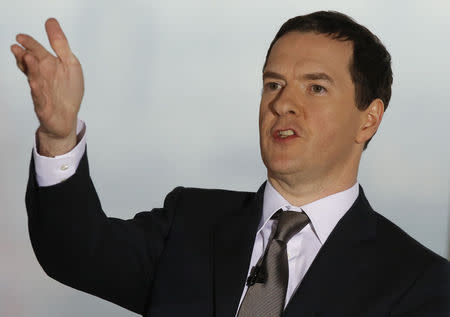Osborne says need to decide on sale of RBS stake soon after election
By William Schomberg and William James
LONDON (Reuters) - Chancellor George Osborne said he would need to decide quickly about a sale of the government's stake in the bailed-out Royal Bank of Scotland after May's election, adding he hoped to be able to recover taxpayers' money.
Osborne also gave more details of his plans to fix Britain's public finances, saying he would hand independent budget forecasters the power to say when the government could stray from running a surplus if the economy ran into trouble.
Less than four months before Britain chooses its next government, Osborne is seeking to persuade voters that the British economy is safest in the hands of his Conservative Party rather than the opposition, left-leaning Labour.
The bailout of RBS is seen as one of darkest hours for British banking, and a successful return to the private sector would be a powerful political symbol for Osborne, who says the previous Labour government mishandled the financial crisis.
The government owns 80 percent of RBS, which was rescued with a 45 billion pound ($73 billion) state bailout. A decision on when to sell the stake would be an early priority if Prime Minister David Cameron is re-elected, Osborne said on Wednesday.
"Early in the next parliament we will have to make a decision on the timing of any exit programme from RBS," he said in the speech delivered to economists at the Bank of England.
"It is not good for taxpayer value or for the competitiveness of our banking system to have such a large and complex bank in state hands for too long."
Osborne said he would require "a lot of persuading" to give up on the principle that the government, and therefore taxpayers, would at least get its money back in the sale.
Shares in RBS are currently trading at about 363 pence, well below the government's 502 pence a share buy-in price, leaving taxpayers sitting on a multi-billion pound potential loss despite signals of interest from possible buyers.
Britain has already sold off some of its stake in another rescued bank, Lloyds Banking Group, and plans to sell more in the coming months.
Osborne also used the speech to give further details of how Britain could maintain its fiscal health once its public accounts are brought close to balance.
He said that while the government should aim to run a budget surplus each year, Britain's official forecasters, the Office for Budget Responsibility, should have powers to define whether the economy was in need of extra support from the public purse.
The assessment would be based on either the rate of economic growth or a given level of spare capacity in the economy and if the trigger was activated, the government would have to set out a strategy for getting the public finances back in the black.
"In the good times we stay in surplus - raising more money than we spend and using that to pay down out debts. And when the bad times come, the government will have to set out a clear plan to get back to health," he said.
(Editing by Alison Williams)




